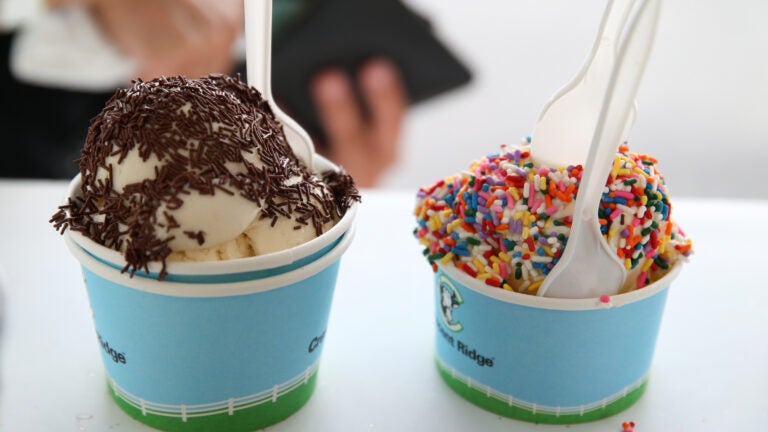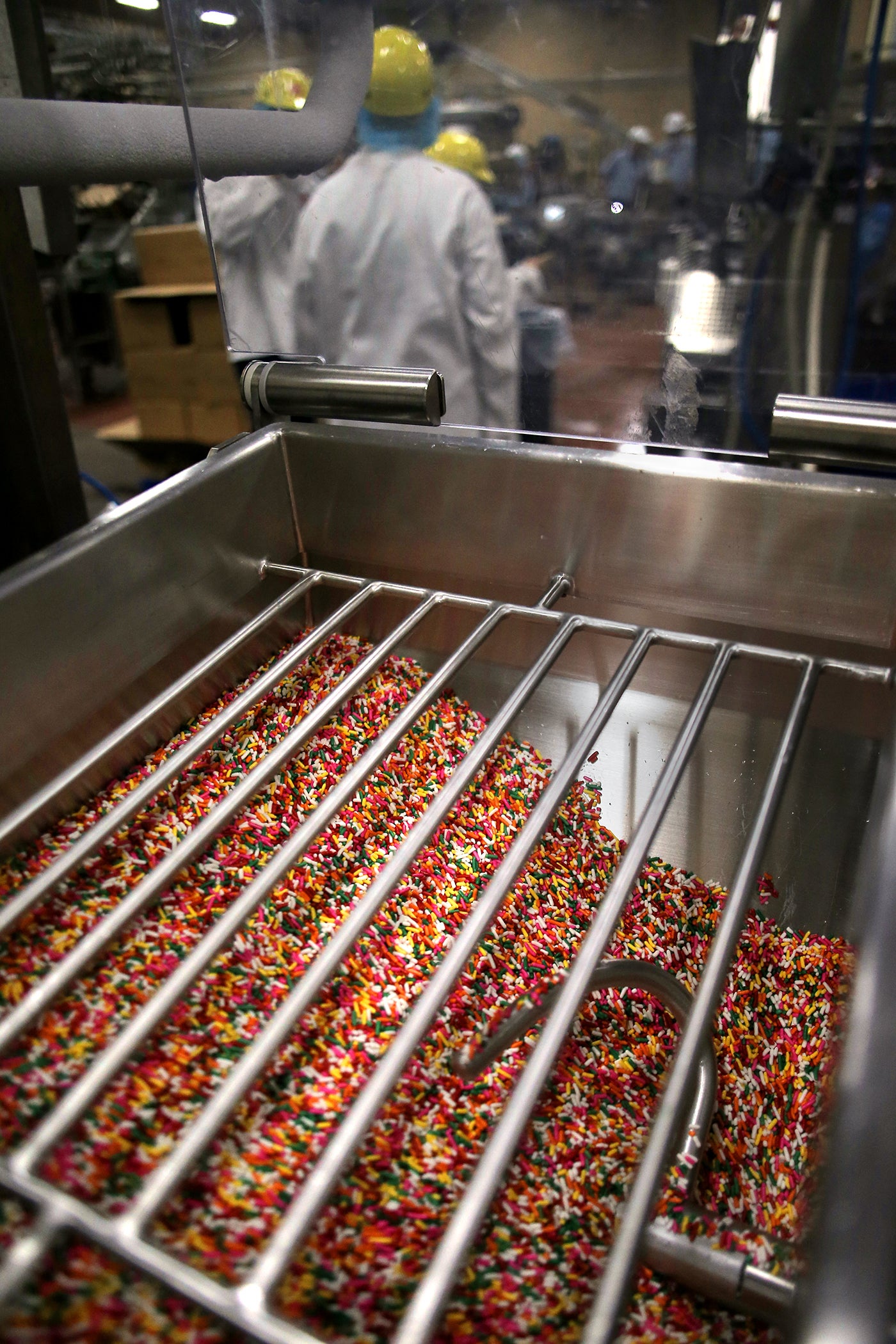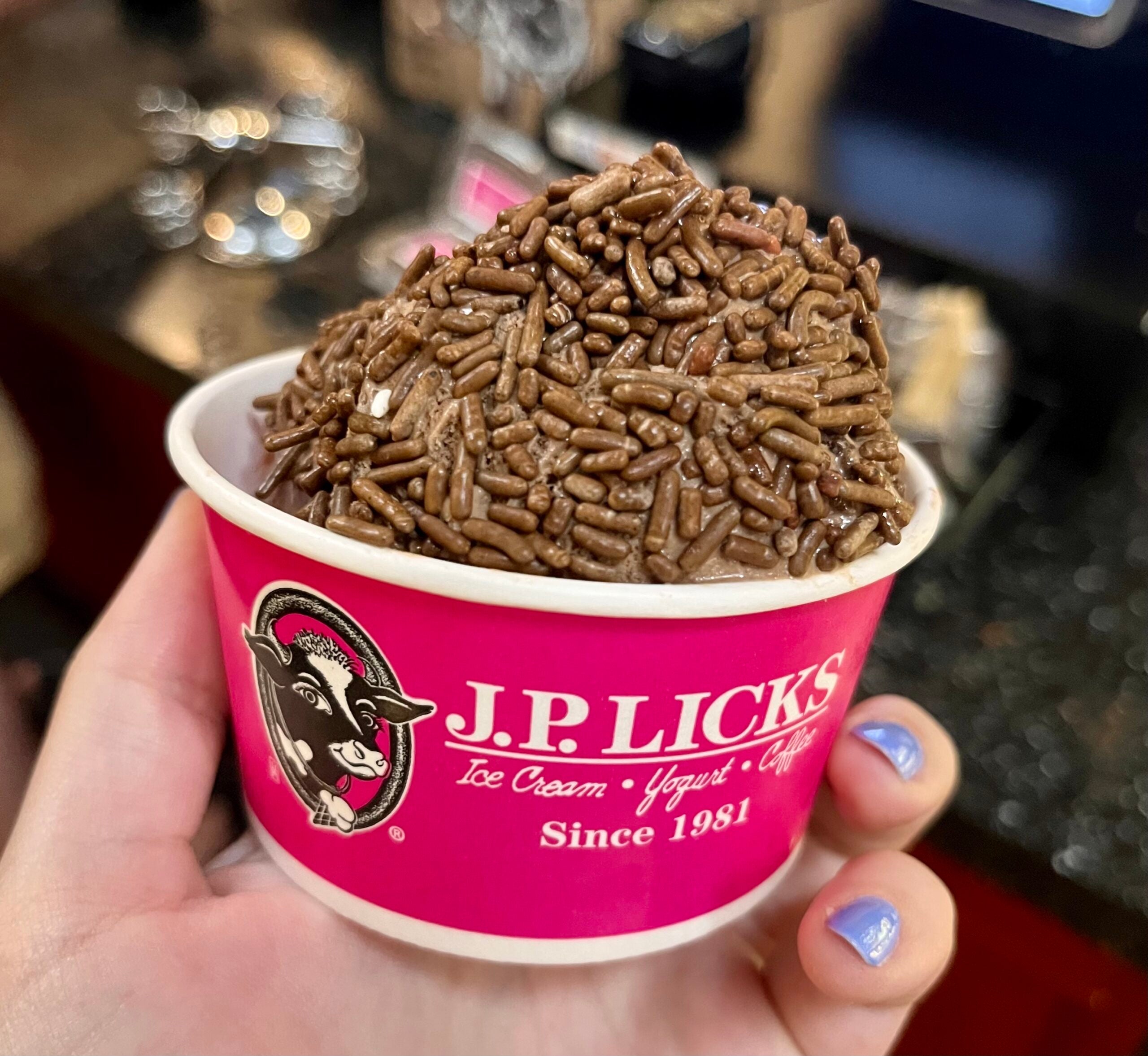Newsletter Signup
Stay up to date on all the latest news from Boston.com

When someone walks into Rancatore’s Ice Cream looking to top their cone with those classic rod-shaped bits of candy, they’ll almost certainly ask for “sprinkles.”
But every now and then, owner Joe Rancatore says, an old-school New Englander will walk in and defiantly order “jimmies” — a throwback to a time when soda was “tonic,” ice cream-based milkshakes were “frappes,” and liquor stores were “packies.”
“It’s definitely the over-50 set, over-60 set that call them ‘jimmies,’” Rancatore said. “‘And I’ll have some jimmies.’ It’s almost like they are emphatically stating it. … But they’re very proud of the terminology.”
While the term “jimmies” has faded in popularity over the years, it’s remained one of those quirky words in the New England lexicon. As American etymologist Barry Popik’s website “The Big Apple” explains, “New York is a ‘sprinkle’ town. If you call them ‘jimmies,’ you’re probably the type of person who roots for the Boston Red Sox.”
The data bears that out: The University of Wisconsin-Milwaukee Dialect Survey, administered between 2004 and 2006, showed strong support for “jimmies” in the Northeast. A contingent of survey-takers also maintained that jimmies are specifically chocolate, while sprinkles are rainbow.
And it’s not just a New England thing: The Philadelphia local news site Billy Penn notes that Philly, Pittsburgh, and parts of the Midwest have their own jimmies vs. sprinkles debates.
Whatever you call them, the love for sprinkles is clear — J.P. Licks founder Vincent Petryk said his ice cream shops go through cases of the stuff. However, the story behind the “jimmies” name is murkier; as it turns out, this simple ice cream topping is rife with debate over its origins.
An archived page from the Brigham’s Ice Cream website puts jimmies’ arrival in Boston around 1947, as Boston.com previously reported in 2015. That seems consistent with the first documented mention in The Boston Globe, a 1948 recipe for “luscious” French icing that could be decorated with chocolate jimmies.
But how did the name come about? There are a few different origin stories, depending on who you ask.
You may hear that jimmies got their name from a fundraiser for the Jimmy Fund, where the cancer care and research charity would receive a donation every time someone ordered sprinkles on their ice cream, as the brand Mr. Sprinkles claims.
However, a 1930 Pittsburgh Press advertisement indicates the term “jimmies” was used to describe chocolate sprinkles long before the Jimmy Fund was founded in 1948.

The Globe speculated in 1982: “Origin unsure, but one ice cream maker offers a Constance Bartlett, Pottstown, Pa., 1901; after grating chocolate over ice cream for her son’s birthday, she reportedly told other children they couldn’t eat them because ‘they’re Jimmy’s.’”
Another story credits the candy company Just Born with coining the name and paying homage to James Bartholomew, the Just Born employee who supposedly ran the company’s sprinkle-making machine.
But David Wilton, author of “Word Myths: Debunking Linguistic Urban Legends,” casts doubt on Just Born’s claim, noting anecdotal evidence that the term “jimmies” was used in the 1920s, before Just Born began making them.
“How the name jimmies for the ice-cream sprinkles arose is simply not known,” Wilton wrote. “Various explanations have been proffered. It may be from the name of a candy maker, or it may be from jim-jam, a term dating from the sixteenth century that can mean a knick-knack or trivial item.”
A more unsavory theory links the sprinkles’ name and brown coloring to Jim Crow laws in the South, though Wilton, Snopes, and a host of other researchers were unable to find evidence pointing to any racist connotation.
“Many of the terms and images that we find racially insulting today were considered innocuous during the early part of the twentieth century,” Wilton noted. “Advertisers were not shy about using associations that we would today consider racist and offensive. But no evidence of such associations with jimmies exists.”
He added: “All we have to prove a racial origin for jimmy is the use of jim, and the fact that some sprinkles are chocolate. Some better evidence must be presented before one can assume a racial origin for the term.”
Likewise, former Globe columnist Jan Freeman investigated jimmies in 2003 and found no evidence to suggest that the name was racially charged.
“Someone, someday, may prove that jimmies was a racist coinage — or that a guy named Jimmy served up the first sprinkles,” Freeman wrote. “But till that happens, linguistic fantasists should keep their mouths off our jimmies.”
The bottom line, according to Snopes: “Sometimes words just sneak into a language without anyone’s knowing, years after the fact, how that process came about.”
These days, sprinkles remain an “immensely popular” ice cream topping, with customers young and old drawn to the colors and textures, according to Rancatore. Petryk, meanwhile, estimates that anywhere between 10 to 15% of J.P. Licks customers order them.
“I get it, in a way. Visually, they’re great,” he said. “If you have sight, you eat with your eyes first. And so you’re prepared to like them, I think, because they’re stimulating your brain in a different way.”
Just don’t expect him to order any on his own ice cream.
“I never was a jimmies fan, even as a child. I didn’t personally enjoy them,” Petryk said. “But for some people, it’s terrible — God forbid we should run out, because it ruins it for them, you know? … I’ve become much more flexible around it over the years. I used to be kind of a snob; if somebody wanted jimmies, I’d kind of look down my nose at them like, ‘Oh, really?’”

Rancatore said he’s not entirely sure why “jimmies” has faded from the local lexicon, but speculated that it may have something to do with America becoming more generic. As an example, he pointed to the broad array of regional terms once used to describe a sub sandwich — hoagies, heroes, grinders, and so on — that have also begun to fade.
“I think that same thing has happened with sprinkles,” Rancatore said. “Just how television changed America in the ’50s and made a lot of homogenization of language, I think that’s happened with the sprinkle.”
Petryk recalls mixed usage of “jimmies” and “sprinkles” even when he first arrived in Boston decades ago.
“I grew up outside of Philadelphia, and they were always ‘jimmies’ there,” he said. “And when I moved to Boston in ’77, some people called them ‘jimmies,’ but most people called them ‘sprinkles.’”
These days, “almost everyone calls them ‘sprinkles’ — adults, children. Old people like me will still call them ‘jimmies,’” Petryk said. “’Sprinkles’ has won the war of what they’re called generically.”
Stay up to date on all the latest news from Boston.com
Stay up to date with everything Boston. Receive the latest news and breaking updates, straight from our newsroom to your inbox.
Conversation
This discussion has ended. Please join elsewhere on Boston.com